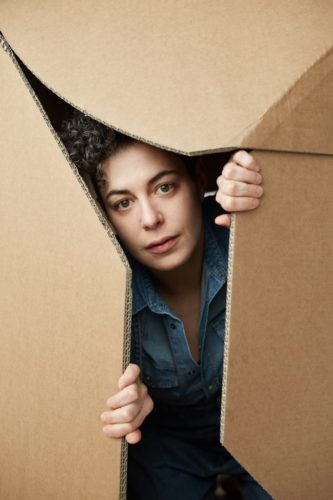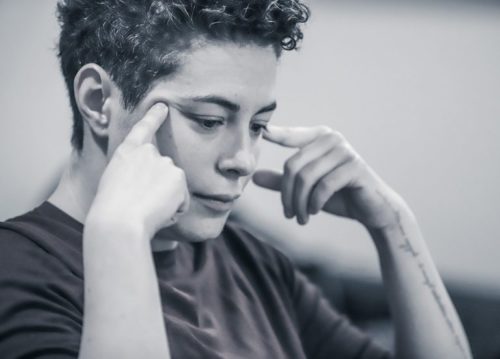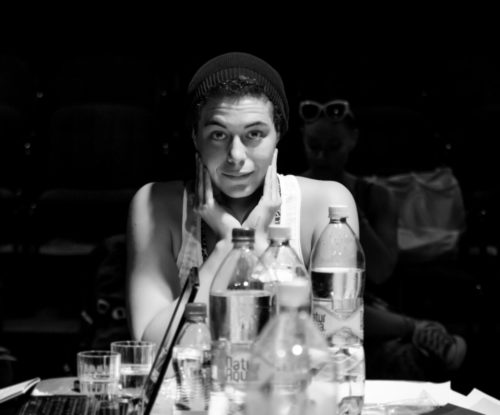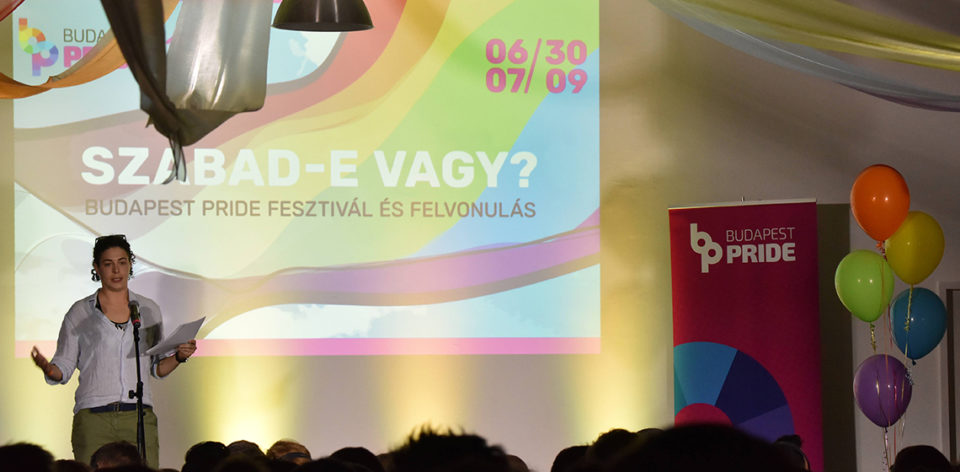Many of you may know Kriszta Székely because of her plays, or because of her speech at the opening ceremony of the Budapest Pride in 2017, where she publicly came out as a gay person. She has come a long way: she studied ballet in Budapest until she was 18, was living in Asia for four years, later worked at RTL, then graduated in stage directing from the University of Theatre and Film Arts Budapest in 2015, and has been a member of the Katona József Theater ever since. She answered all my questions openly and for the first time in her life she shared how she found out she was gay.
Please note that she gave us the interview in 2019, so it does not cover recent events, but we still consider the interview relevant and a timeless piece.
In March 2019, you were included in the list of the most influential Hungarian women in Forbes magazine. What was that like?
It flatters me of course, and I can only hope that I can live up to its expectations. I feel that being open and visible comes with some responsibility in any social or artistic question. Being an artist in Hungary is actually a mission, because people don’t really focus on culture. When there is an opportunity for visibility in front of a larger audience, I always consider it important. In that sense, I was very happy for this opportunity.
Does the responsibility of visibility at work feel depressing or inspiring?
I guess it’s rather inspiring. This is part of my life. When I became a public figure, that was a conscious decision. I happily say things out loud, not just in the theater. So it's not burdensome for me at all.

Have you ever regretted this decision?
I don't usually regret anything.
How do you tolerate the media’s interest and questions on your professional or private life?
I can manage it pretty well for now. There are things I say no to and I refuse tabloids. Obviously, I prefer talking about my work because I can’t really tell you anything interesting about my private life, beyond that sensational thing that I live with a woman. But when I said yes to this Pride gig, I knew that I would have to talk about my private life sometimes. So I’m not surprised when I am asked about it because I have known that this was coming.
Don't you find it hard to speak publicly about your homosexuality in interviews?
No, it’s not a problem, but I find this fuss and outcry about sexual orientations rather ridiculous. Why can't we move on already? It’s sometimes very irritating. I don't believe that this topic has such sensational value in western countries just a few hundred kilometres away. But we still have to push this issue in Hungary so we deal with it now.
If the Hungarian people are not that tolerant, don't you still believe that it is important to talk about this issue?
Yes, I do, it’s important, otherwise I wouldn't do it. I was sitting in this gala (award ceremony of SzuperWMN in 2018 - the editor) with a woman who deals with pollution and climate change (Diána Ürge-Vorsatz, climatologist - the editor), on my other side sat Kriszta Szalai, who helps homeless people. And I was there because I was gay. OK, certain people think it’s a big deal to be open about it. But in the meanwhile I do wish for the Hungarian people to get over it already because there is nothing really to talk about. But as long as that’s not the case, I strongly believe that public figures must represent this, they must be visible and they must show that it’s part of life, too. Gays are not monsters, but they are humans.

How did you find the LGBT community in Budapest in 2019?
I was visiting London a lot during winter, and the diversity I experienced was heart-warming. I was standing at the Christmas market and a gay couple in their sixties were holding hands while picking presents at a small stand. A lot of things obviously work better in the West, and it’s a commonplace. But I think the Budapest community has a hard time because we don’t live in a country that would promote acceptance, but it promotes the opposite. And this is not only dangerous in topics of homosexulity, but in other aspects of our lives in general.
I don’t think the tolerance level is set in the right place, and that’s obviously making it harder for the community to flourish and to be visible. So I wouldn't particularly blame the community for anything, and I wouldn’t think that more could be done in Hungary today. The general vibe does not really help it. Which is wrong because it would be important that we are tolerant with each other and not only in this issue, but it would be super cool to teach people acceptance in general.
You talk openly about your gayness, but you don’t usually talk about how you got to this point. Is this a conscious decision?
No one ever asked me about it before and I didn’t think of making a statement.
And if I ask you, would you talk about it?
Gladly. It’s a very simple story.
How did it start? How did you know?
I always felt it. I knew exactly who I wanted to play with, already in kindergarten. And then during puberty, I was interested in everything. I had relationships with guys, too, even long-term relationships. I didn’t feel anxiety, I was invested in these relationships, they just didn’t work. But there wasn’t any big turning point or big revelation. I would rather say that actualIy I was already gay in kindergarten.
When did you say that “yep, I’m gay” to yourself?
was still very young, I was visiting acquaintances in the countryside during summer. We were watching Dallas, the series, in which a young girl named Lucy had a boyfriend. For some reason, this boy wouldn’t sleep with her. They sat sadly on the bed, the boy was very broken, Lucy didn't understand why things weren't happening. The boy eventually said that he was homosexual. I asked my rural acquaintances what “homosexual” meant. They said when a woman loved another woman. Back then, with my seven or eight year-old brain, it was an enlightening experience. I could put a name to something that was very natural for me as a child. It was a moment of recognition.
My youth was characterized by freedom. I didn’t want to define myself for a very long time. If I have to define this period, I lived a life similar to bisexuality until I became like twenty-five years old. I longed for freedom and not for categorizing certain things.
And after you turned twenty-five?
I started having long-term relationships. Before that I hadn’t really committed myself to constant, monogamous situations. I had been travelling a lot, I had been crazy about the world out there. But when I returned home and fell in love and moved in together with someone, that was with a woman. When it ended, my next relationship was with a woman, too. Suddenly I noticed that it stayed this way. Now I think that this will probably not change.
When did you tell your parents?
My life changed a lot when I quit classical ballet. It was about the same time when my parents learned that my life probably wouldn’t be as straightforward and by the book as parents might wish it to be for their kids. It turned out because I had a relationship with a boy back then, but I started backing away from that relationship and my parents couldn’t really follow me. They rooted for me to stay alive and be okay. Then there was a point when we had to talk about this. And then they had to process that. And they processed it.
Was this really so easy? Did they just simply process it?
They should answer this question. I quickly left for Asia, and didn't participate in any of this. I didn’t really want to. I neither wanted to have long talks with my mom about it. I had such a thirst for life, I just wished to go on my own way. So I disappeared for four years. We kept in touch of course, but I think they did most of the work in the meantime. When I calmed down and I started a life that could be somewhat defined, they relaxed, too.
Hasn’t this topic become a taboo?
Not at all, we don’t have any problems with it, our relationship is still good. I have very intelligent parents. They move in better circles but they had to digest it, they had to process it, too. Today, this is not a topic, in a positive sense, it is completely natural.
Have you ever experienced any advantage because you are a lesbian? For example, do you get more attention from the media as a result?
I can only hope and I do think that my sexuality has nothing to do with my professional progress. The thing that makes me interesting in certain issues is my personality and who I am in general and not my sexuality. I could be a lesbian in a way that wouldn’t interest anyone if for example I felt anxious and I couldn’t talk about it. But my personality has certain traits that make me open, that make me happily stand up for things in an honest way, I think that’s where my advantage rather comes from.
Maybe If I wasn’t lesbian, people would still love listening to me. In my experience, I prefer watching interviews with people who have balls. For this, you don’t have to be gay. People prefer listening to those who just own their life as it is. I think this has more to do with it, but maybe people just enjoy gossiping about it.

Is there an internal drive that makes you so open with it or have you consciously made a decision?
I believe that I’m responsible for this community. For those people, who don’t necessarily find happiness in a traditional Christian male-female relationship. Your sense of justice simply can’t let you rest. You have an opinion on certain things, you want to ask certain questions. I’m a director for these same things.
Do you think that theaters should picture gays, thus promoting acceptance in the society?
The duty of a theater is to make shows on any topic that reflects on today’s society. Thus, it’s its job to tell stories about gay people. I don’t know if theaters have the power to stretch the tolerance level of a society. I don’t think they have so much influence. At best, they can draw in a few hundred people to watch a play which makes them think about it. Then like a virus it can spread in the web of human connections.
But I don’t believe there is a single play which changes society overnight. You may find satisfaction in this field if the number of that few hundred people grows to thousands and thousands of people. People who might take away something and do things differently. But surely it’s also a very big deal if you can influence only a few lives, you shouldn’t wish for more I guess.
The interview was made by: Zsófi Győrffy
Source of the pictures: 1, 2, 3
Translated by Emese Balogh

